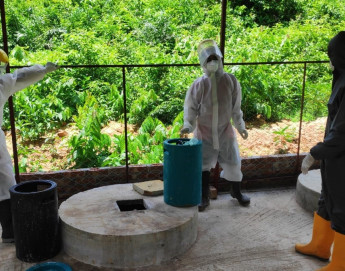
Bangladesh: Safe sludge disposal improves health of people in Teknaf Municipality

"We used to struggle because of unhygienic toilets and our children used to suffer frequent illnesses. But now, with proper sanitary facilities and affordable sludge removal service, everyone in the community is able to enjoy a healthier life," says Nobi Hossain, a resident of Teknaf Municipality, Cox's Bazar.
In Teknaf Municipality, where around 30,000 residents live, the lack of safe sanitary solutions had created a cycle of health hazards and environmental degradation especially following the influx of people from Rakhine escaping violence in 2017. Manual emptying of septic tanks and pits was the norm, with over 90% sludge being discharged directly into the surroundings, posing grave risk to their health and well-being.
Responding to the needs of the community, the International Committee of the Red Cross (ICRC) initiated a faecal sludge management (FSM) project in February 2019 and in partnership with the municipality set up a facility in March 2020 to curb water and vector-borne diseases like diarrhoea and skin ailments by efficiently collecting and treating faecal sludge.
Over 500 households have used the service since its launch, resulting in the safe collection and treatment of approximately 1,000 cubic metres of sludge. Besides developing infrastructure, the project also focused on educating community members about the dangers of improper sludge disposal and environmental pollution. In the last two years, 3,500 families were visited and given awareness through hygiene promotion activities.
The ICRC handed over the project to the Teknaf Municipality in December 2023, ensuring its sustainable continuity. Expressing gratitude to the ICRC for the fruitful partnership, Mohammad Islam, Teknaf Municipality's mayor, highlighted that the facility is a testament to the commitment to community well-being. By addressing the twin challenges of public health and environmental degradation, this project not only improves lives but also safeguards the natural surroundings for future generations.


